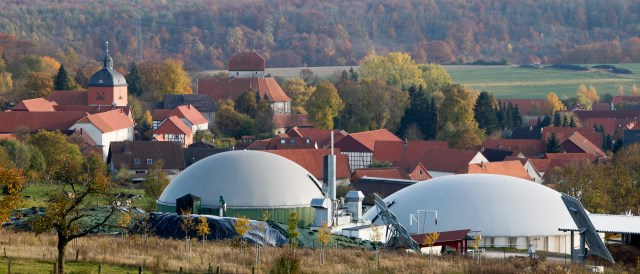Recently, the UK’s Sam Friggens spoke of community ownership in Germany as crowdfunding. Craig Morris wondered why he had never heard the Germans call it that, and he could think of two reasons – one small, the other big.

Bioenergy village Juehnde, in which the biogas plant is owned by a local cooperative of citizens. (FNR/Jan Zappner)
A few weeks ago, we republished an article by Friggens on Germany’s energy transition, which he describes quite well. On his blog, he also praised Germans for their commitment to “people-powered finance to fund their country’s renewables revolution.” The weird thing is, however, that he speaks of crowdfunding, something I have not heard the Germans call it. So I started thinking – if there are differences between crowdfunding and German energy co-ops, do they really matter?
To begin with, there are projects in Germany that speak of crowdfunding, specifically when social media/the Internet are used to generate interest and revenue, such as in this project described (in German) by German blogger Andreas Kühl. Indeed, local governments have discovered “Schwarmfinanzierung” (literally, swarm financing – the less common German term) for all kinds of infrastructure projects, but as this newspaper report (again, in German) shows, the focus is on the virtual platform. But that report is itself a good example of what I’m talking about; it says that “a lot of public officials are initially skeptical about collective financing, which remains relatively unknown” – and that in the country that is leading the world in community ownership of renewables.
So the first small difference is the platform. Crowdfunding is linked to the Internet, whereas the German community ownership movement began in the 1990s, when the Internet was still something for young geeks. Even today, most community projects in Germany start with newspaper ads and print announcements inviting people to town hall meetings.
Which leads me to the bigger difference: the Internet knows no geography, but town hall meetings do. As I wrote in the Böll’s Foundation’s paper entitled German Energy Freedom (PDF) last year, some community projects do not let out-of-towners invest at all. Others allow those locally affected to buy smaller stakes starting at, say, €1,000 per share, whereas shares for the general public might start at €3,000.
The good thing about this distinction between relatively anonymous crowdfunding and German-style energy co-ops is the democratic input you get from the latter. People are able to come together and decide what gets built where. A town might decide to build just a couple of turbines owned by locals, but they might oppose a large wind farm owned by some out-of-town corporation. As Jochen Homann, head of German grid regulator BNetzA, recently explained (in German), “there is no such thing as Wutbürger (angry citizens) who oppose everything.” Rather, he said, most citizens have sensible concerns and deserve to be heard out (and yes, some fringe elements are not sensible).
And of course, the good thing about crowdfunding is that it leverages citizen investments across a wider area. Where I live in Freiburg, Germany, a town of some 230,000 people, citizens are still able to hold town hall meetings for energy projects, but when Berliners get together to invest in projects in the countryside outside the city, a virtual platform can make things easier – assuming there is no resistance to out-of-towners changing the local landscape.
In a nutshell, the difference between crowdfunding and German energy co-ops is democratic input. The distinction is worth making because the press repeatedly focuses on prices, technological hurdles, etc., but almost no one writes about how Germans are democratizing energy supply.
So if you read all of these horror stories about Germany’s energy transition and never hear about energy democracy, you may wonder, “Why are the Germans doing that?” You’ll find the answer as the second item in our Key Findings: “The German energy transition is driven by citizens and communities.”
Craig Morris (@PPchef) is the lead author of German Energy Transition. He directs Petite Planète and writes every workday for Renewables International.
[…] Community Ownership – Is It Crowdfunding? […]